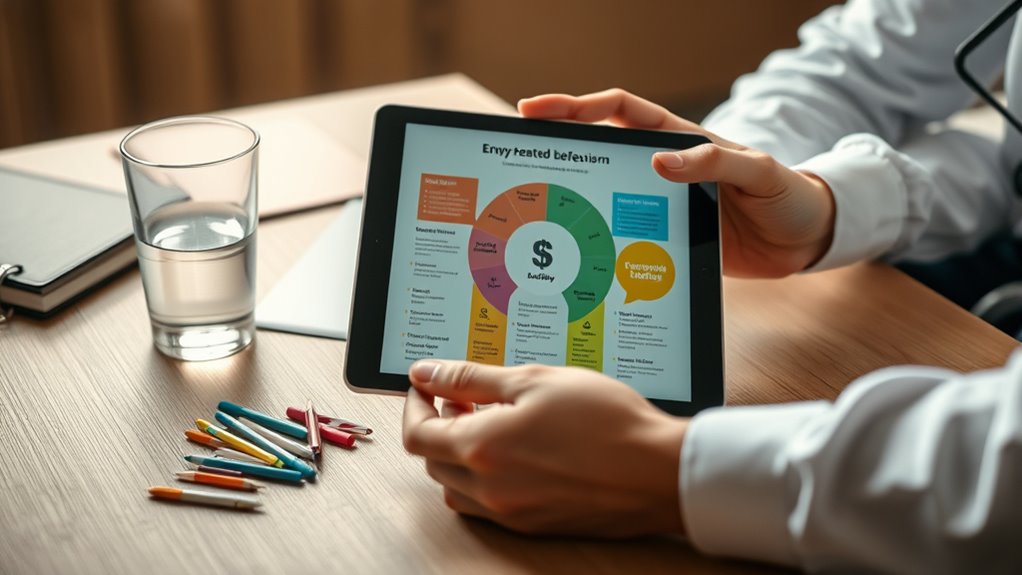Psychologists diagnose Narcissistic Personality Disorder (NPD) by evaluating nine key criteria: evidence of grandiose self-importance, preoccupation with success or power fantasies, a belief of being “special” and unique, a need for excessive admiration, a sense of entitlement, exploitative behaviors, lack of empathy, envy and related acts, and emotional instability that affects self-esteem. If you keep exploring, you’ll uncover how these traits shape narcissistic behaviors and self-perception.
Key Takeaways
- Psychologists use DSM-5 criteria, which include nine specific symptoms to diagnose Narcissistic Personality Disorder (NPD).
- The criteria assess patterns of grandiosity, need for admiration, and lack of empathy over time.
- Diagnostic tools involve clinical interviews, self-report questionnaires, and behavioral observations.
- Psychologists evaluate the presence and severity of traits like entitlement, exploitative behavior, and emotional instability.
- The assessment considers how these traits impair functioning across relationships, work, and social settings.
Evidence of Grandiose Self-Importance

What are the key indicators of grandiose self-importance in narcissistic personality disorder? You often exhibit overconfidence, believing your abilities surpass others’. Skepticism toward experts shows your doubt in outside authority, reinforcing your self-view. Impulsive decisions reveal a tendency to prioritize personal desires over rational judgment. These traits reflect core diagnostic features like grandiosity, self-centeredness, and entitlement, which remain consistent across different situations. You may dismiss others’ achievements, view yourself as uniquely special, and expect special treatment without earning it. Your arrogance and persistent sense of superiority drive these behaviors. This pattern of exaggerated self-importance impacts your relationships and how you perceive yourself, emphasizing your belief that you’re fundamentally more deserving or capable than those around you. This overinflated sense of importance often leads to challenges in forming genuine connections, as others may perceive your attitude as dismissive or condescending. Additionally, a lack of empathy can further hinder meaningful interactions, making it difficult to understand or care about others’ perspectives. Recognizing these traits is essential because they are rooted in a pervasive sense of entitlement, which influences many aspects of behavior and social interactions. Moreover, this inflated self-view can contribute to a fragile self-esteem, causing you to seek constant validation to maintain your self-image. Furthermore, these characteristics can be reinforced by behaviors associated with textile line and other protective styles, which can serve as symbols of status or self-assertion.
Preoccupation With Fantasies of Success or Power

Individuals with narcissistic personality disorder often fixate on grandiose fantasies of success, power, or ideal relationships, which serve to reinforce their inflated self-image. These fantasies involve exaggerated scenarios of unlimited achievement, brilliance, beauty, or romantic perfection, diverging sharply from reality. You may find yourself emotionally prioritizing these fantasies over actual accomplishments or relationships. These internal images often involve an idealized self, like being perfect or exceptionally talented. You might frequently talk about your achievements or aspirations to gain admiration or manipulate others to support your fantasies. Envy of perceived rivals and arrogance when discussing your goals are common behaviors. Often, these fantasies reduce motivation to improve, as you believe your inherent superiority already secures your desired status. Research indicates that such preoccupations can serve as a defense mechanism to mask feelings of deep shame or insecurity. Recognizing these fantasies of success can be crucial in understanding your true motivations and emotional needs. Additionally, understanding the self-image you project can help reveal underlying vulnerabilities that drive these preoccupations. Incorporating an awareness of personalized self-concept and how it influences your perceptions can further aid in self-reflection and emotional growth. Being aware of how self-perception interacts with these fantasies can help in developing a more grounded and authentic self-view.
Belief of Being “Special” and Unique

Believing you are “special” and unique leads to significant emotional distance from others, as your interactions often revolve around self-enhancement rather than genuine connection. You tend to see others as either inferior or potential rivals, making it hard to build authentic relationships. You overestimate your abilities, magnify minor achievements, and think conventional rules don’t apply to you because of your supposed “specialness.” This mindset fuels your expectation that others should automatically comply with your demands. You may reject feedback from those you view as non-superiors, exploiting relationships to maintain your sense of expertise. When slighted, you display haughty attitudes, and you often keep failures secret to protect your illusion of perfection. These beliefs create barriers that isolate you emotionally from meaningful connections. Recognizing these patterns can be a first step toward personal growth techniques that foster healthier, more genuine relationships. Understanding how trait development occurs in early life can help in addressing these patterns effectively. Additionally, acknowledging the influence of early childhood experiences can shed light on the origins of these narcissistic traits and support targeted interventions. Incorporating energetic alignment principles from the Law of Attraction may also help shift your perspective towards more authentic self-awareness.
Need for Excessive Admiration and Attention

Your sense of being “special” and unique often drives you to seek constant validation from others. You crave attention and reassurance, whether through openly bragging or subtle manipulation. You might fish for compliments or perform small acts of self-pity to evoke sympathy. You constantly need others to affirm your talents, looks, or intelligence, especially on social media with likes and comments. In conversations, you dominate by sharing self-focused stories, dismissing others’ contributions to stay the center of attention. This behavior can be reinforced by a desire for social validation, which fuels your need for admiration. Additionally, the tendency to seek targeted messaging can intensify your focus on receiving recognition and approval.
Sense of Entitlement and Expectation of Favoritism

You might notice that some individuals demand special treatment or expect others to comply with their wishes without question. They often feel entitled to privileges or skip boundaries because they believe they deserve more. This sense of privilege fuels their expectation that others will automatically support their needs and preferences. Entitlement is a hallmark indicator of Narcissistic Personality Disorder, and these behaviors are often rooted in early family environments that either overindulge or neglect emotional development. Additionally, the self-esteem of such individuals may be disproportionately inflated to justify their sense of entitlement, which can also be linked to their tendency to seek validation from others to reinforce their inflated self-view. Furthermore, research indicates that early family environments significantly influence the development of entitlement traits, often shaping their expectations and behaviors in adulthood.
Demanding Special Treatment
Demanding special treatment involves a persistent expectation that others should automatically grant privileges, exceptions, or benefits without considering effort or fairness. You believe you’re inherently deserving of unique advantages, expecting others to comply without question. This often manifests as insisting on special favors or exemptions, regardless of effort or fairness. You assume others are obliged to meet your needs or demands, viewing exploitation as normal and justified. When your expectations aren’t met, resentment and anger quickly follow, seen as personal injustices. You might:
- Demand assistance or attention without reciprocation
- Use guilt or emotional manipulation to enforce compliance
- Insist only high-status individuals are worthy of your efforts
- Expect others to serve your needs while refusing to support them in return
- Entitlement can also lead to a dismissive attitude toward others’ boundaries and needs. Recognizing patterns of leadership styles associated with narcissism can help in understanding and addressing these behaviors. Additionally, such behaviors often stem from an inflated sense of self-importance and a lack of empathy, which are key features identified in vetted psychological assessments of narcissism. For example, these behaviors are reinforced by a tendency to undervalue others’ contributions and overvalue one’s own, which often correlates with the inflated self-image typical of narcissistic individuals.
Expectation of Compliance
Have you ever noticed someone expecting automatic compliance to their demands despite little achievement or effort? People with Narcissistic Personality Disorder often believe they deserve special treatment without earning it. They expect others to follow their wishes automatically, regardless of the situation. This sense of entitlement leads them to demand exceptions or prioritization, ignoring boundaries or limitations. They may become angry or devalue others when their expectations aren’t met, using manipulation or coercion to enforce compliance. Their self-centered view justifies these demands as deserved because of their perceived superiority. This persistent expectation strains relationships, as others feel pressured or exploited. You might see them repeatedly insist on special favors, disregarding others’ needs or fairness, driven by their belief that they are inherently deserving of unquestioned obedience. Their belief in being inherently superior often causes them to dismiss the importance of fairness or mutual respect in interactions. Additionally, their sense of entitlement can lead to manipulative behaviors aimed at maintaining control and asserting dominance in social dynamics.
Sense of Privilege
People with Narcissistic Personality Disorder often carry a deep sense of privilege that reinforces their belief they deserve special treatment. They expect automatic advantages without earning them, believing they’re inherently superior. You might notice they associate only with high-status people, assuming this elevates their standing. They often ignore societal rules, assuming exemptions apply to them, and set unrealistically high standards that they don’t extend to others. Their sense of entitlement fuels anger when their expectations aren’t met. Research indicates that their inflated self-view leads them to dismiss others’ perspectives, further isolating them socially. This sense of entitlement can also cause them to dismiss constructive criticism and cling to their perceived superiority in social settings. Their tendency to dismiss feedback is often driven by a sense of privilege that blinds them from recognizing their flaws. Additionally, their belief in their inherent worth often leads them to overestimate their importance in social and professional environments, reinforcing their sense of entitlement. Their inflated self-image may also be linked to a reliance on positive reinforcement from others to maintain their sense of superiority.
Exploitative Behaviors in Relationships

Exploitative behaviors in relationships often involve manipulative tactics designed to maintain control and benefit the narcissist at the expense of their partner. You might experience gaslighting, where reality is distorted, or emotional blackmail, with love offered conditionally. They may violate boundaries, spend shared finances without consent, or threaten self-harm to coerce compliance. These tactics create a cycle of dependency, leveraging their partner’s vulnerability for personal gain. You could be used for status, objectified as a tool, or isolated from support networks. Here’s a glimpse of typical behaviors:
| Manipulation Tactic | Power Dynamic | Impact |
|---|---|---|
| Gaslighting | Undermines self-trust | Confusion, self-doubt |
| Emotional Blackmail | Enforces obedience | Guilt, anxiety |
| Boundary Violation | Disregards consent | Loss of autonomy |
| Financial Exploitation | Resource control | Financial dependence |
| Public Displays | Social manipulation | Jealousy, admiration |
These tactics erode your self-esteem and independence over time. Understanding narcissistic behavior and its spectrum helps to recognize that such exploitative tactics are often part of a broader pattern of emotional abuse that can be difficult to identify without awareness.
Lack of Empathy for Others’ Feelings

Why do individuals with Narcissistic Personality Disorder often struggle to genuinely understand or care about others’ feelings? Their empathy is conditional and situational. They respond only when self-interest is involved, such as gaining control or admiration. They prefer positive emotions, like celebrating others’ successes, but dismiss or contemptuously react to suffering or weakness. Their empathy is often a tool for manipulation, using exaggerated stories to exploit others’ feelings. Research shows that their brain patterns reflect self-focus and coldness, limiting their capacity for genuine compassion. They recognize emotions intellectually but don’t internalize or connect with them. They withdraw or become defensive when faced with vulnerability. They see others’ pain as a challenge or threat to their superiority. They perform empathetic acts only in specific contexts, like giving advice, but dismiss personal relevance.
Envy and Envy-Related Behaviors

Envy deeply influences how individuals with NPD see themselves, often shaping their self-image through comparisons and perceived threats. Their behaviors—such as sabotaging others or projecting insecurity—are driven by this intense need to protect their fragile self-worth. Understanding these envy-driven actions helps reveal how they impact relationships and self-perception. Envy is a fundamental aspect of narcissistic pathology, and recognizing its role can be crucial in diagnosing and treating NPD.
Envy’s Impact on Self-Image
Envy profoundly influences how you see yourself, shaping self-image through cognitive, emotional, and behavioral pathways. When you feel envy, your attention becomes fixated on the envied targets, making their advantages seem more prominent. Social media amplifies this effect by increasing comparisons, which lowers your self-esteem and strains your thinking. Benign envy prompts focus inward, motivating self-improvement, while malicious envy directs your gaze outward, fostering rivalry. Memory biases cause you to overremember details about those you envy, reinforcing feelings of inadequacy. Additionally, processing envy depletes your mental resources, making it harder to concentrate on personal growth or self-assessment. These mechanisms work together to distort your self-image, either by fueling self-criticism or by encouraging aspirational change. Envy’s social context can further influence how these processes unfold, as cultural norms and social environments shape your responses to envy and its impact on self-perception.
Behaviors Driven by Envy
Have you ever noticed how feelings of envy can drive people to manipulate, sabotage, or undermine others? Narcissists often lash out when their grandiose self-perception is challenged by someone’s success. They may discredit achievements, spread rumors, or distort perceptions to make others’ wins seem undeserved. Their entitlement mindset fuels resentment when their needs go unmet, leading to blame-shifting or passive-aggressive criticism. Envy also prompts them to gaslight, making targets doubt their experiences, or triangulate by creating rivalries that weaken their competition. These behaviors serve to protect their fragile self-esteem, which depends on external validation. Envious Narcissists’ undermine efforts to maintain their self-worth, ultimately, envy-driven actions erode others’ successes, cause emotional harm, and reinforce the narcissist’s perception of victimhood—all while masking deeper insecurities and a need for control.
Emotional Instability and Fluctuating Self-Esteem

Individuals with Narcissistic Personality Disorder often experience significant fluctuations in self-esteem that stem from underlying insecurities. These shifts can cause emotional instability, making it hard to maintain consistent confidence. You might feel a sudden surge of pride when praised, only to plunge into shame when criticized. This instability is driven by fragile self-perceptions and fear of being exposed or rejected. Research shows that these self-esteem fluctuations are linked to neurobiological abnormalities in regions such as the prefrontal cortex and insula, which regulate emotional responses and self-awareness.
- Feelings of shame, helplessness, or anger that come and go unpredictably
- Internal conflicts when reality clashes with grandiose self-image
- Impulsivity leading to mood swings and emotional outbursts
- Reactions to others’ feelings that evoke shame, disgust, or powerlessness, further destabilizing your emotions
Frequently Asked Questions
How Do Clinicians Differentiate NPD From High Self-Confidence?
When distinguishing NPD from high self-confidence, you look for key signs. With NPD, you notice a persistent sense of entitlement, exploitative behavior, and a lack of empathy, which aren’t present in confident individuals. Confidence is rooted in genuine achievement, while NPD relies on validation and admiration. Also, NPD traits stay stable across situations and are resistant to feedback, unlike healthy self-confidence that adapts and grows with experience.
Can Cultural Factors Influence NPD Diagnosis Criteria?
You should consider that cultural factors definitely influence NPD diagnosis criteria. In some societies, behaviors like self-promotion or assertiveness are normal, while in others, they may seem excessive. Cultural norms shape how narcissistic traits are expressed and understood, potentially leading to misdiagnosis. As a clinician, you need to be aware of these cultural differences to accurately assess whether someone’s behavior reflects pathology or cultural adaptation.
How Reliable Are Self-Report Measures for Narcissistic Traits?
Imagine trying to gauge a swirling storm with a tiny, flickering flashlight—that’s how reliable self-report measures for narcissistic traits are. You might get a glimpse, but they often underestimate severity, especially for vulnerable aspects. Self-reports tend to focus on grandiosity, missing hidden vulnerabilities. Without clinical interviews or informant input, you risk missing the full picture, making reliance on self-reports alone a shaky foundation for accurate diagnosis.
What Role Do Childhood Experiences Play in NPD Development?
Childhood experiences profoundly influence NPD development. When you face neglect, abuse, or household dysfunction, you might struggle with insecure attachment and self-worth issues. Overvaluation from parents can inflate your self-image, while inconsistency creates confusion and hypersensitivity to criticism. These early hardships shape how you see yourself and others, often leading to narcissistic traits as a way to cope with insecurity or seek validation. Addressing these roots helps in treatment and prevention.
Are There Effective Treatments for Managing NPD Symptoms?
You wonder if there’s effective treatment for NPD symptoms. The good news is, yes, various therapies can help manage these traits. Cognitive-behavioral approaches challenge distorted beliefs, psychodynamic therapy explores childhood roots, and schema-focused techniques rewire maladaptive patterns. Supportive therapies foster empathy, mindfulness reduces emotional dysregulation, and group settings improve social skills. With consistent effort and tailored interventions, you can learn healthier ways to relate, feel, and grow beyond narcissistic tendencies.
Conclusion
Understanding these nine criteria is like peeling back the layers of a complex onion—you gain clarity on what truly defines narcissism. By recognizing signs like grandiosity, entitlement, and lack of empathy, you can better identify NPD in yourself or others. Remember, these traits aren’t just surface-level; they’re deeply woven into behavior. Spotting them is like holding a mirror to the mind, revealing the intricate and often hidden patterns behind narcissistic tendencies.











